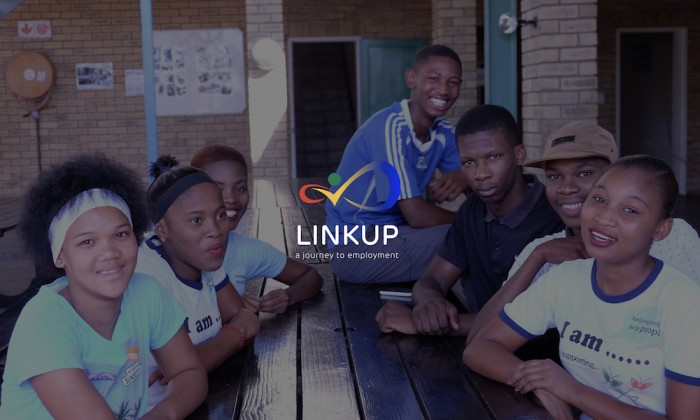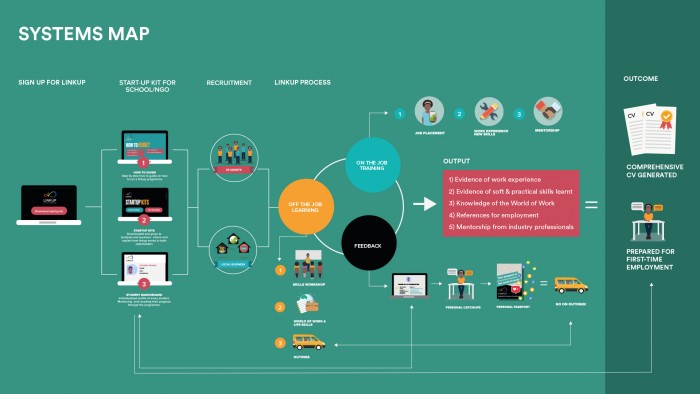In 2017 there were approximately 71 million unemployed youth globally, accounting for 35 per cent of the unemployed population worldwide. In South Africa, where the word youth refers to anyone between the ages of 15-34, around 38.2 per cent were recorded as unemployed as of May 2018.
Not only are they unemployed, but they are not enrolled in any sort of education or training programmes either. This paints a bleak picture for both the wellbeing of these individuals and the country’s economy. With few prospects on the horizon, it becomes increasingly harder for young people to work themselves out of poverty.
Social impact designer Hazel Scrimgeour conceptualised and created the LINKUP platform with South Africa's context in mind. It’s a platform that uses gamification and soft skills to develop youth so that they’re equipped to enter the workforce.
LINKUP arranges and facilitates internship opportunities for young people with an aim to generate a professional CV. It was designed in collaboration with NGO Butterfly House and the Royal College of Art’s Service Design department and consists of a three-step journey including skills workshops, workplace internships and monthly outings. These all contribute to what they call the ‘soft skills development passport,’ which by the end of the programme, will in turn contribute to the individual’s CV, all generated on the platform.
Both off the job and on the job training occurs across industries such as agribusiness, retail, hospitality, construction and trade. It’s no mistake that these are areas in which practical learning is essential.
The initial pilot programme kicked off in March 2018 and consisted of seven students and three businesses; it’s now grown to twenty students with the addition of two more businesses.
With a seasoned background in advertising and marketing, Scrimgeour has picked up awards for her design work in the field over the years. But she’d grown discontent and had somewhat of a career epiphany in 2013. So much so that she wrote a letter to IDEO’s Tim Brown, expressing her frustration at not feeling empowered to do more with her skills as a designer. These are excerpts from that letter:
I sit every day in my award-winning advertising agency behind my computer with my headphones on. I design websites, apps, TV adverts and social media campaigns. I am angry, I am sad, I was sure my talents were meant for something more than thi
I am frustrated that in a country with so much potential for positive change there are so few if no places for a young designer as myself to be part of this change. There are no design institutions that even offer me the opportunity to study Service Design in Africa. The truth is I must look for a full design scholarship that will permit me into a University in either London/USA/Europe (which are tough to come by). I must then move to a 1st world country to solve 3rd world problems. How does this make sense? I believe Africans should be empowered to solve African problems because how are we then going to move forward. We need to take responsibility for our own change.
This, she says, was the moment she’d decided she needed to do more to make a difference in the world.
Scrimgeour went on to receive a full Abraaj scholarship to complete her MA in Service Design at London’s Royal College of Art. Her dissertation looked at decolonising social impact design for Africa, by analysing current design methodologies and practices. What she found was that many of the ‘solutions’ devised for an African context often didn’t achieve its intended outcome.
This led her to realise a flaw typical in solutions proposed by Western designers: a lack of awareness of context. “I often believe that as westerners we may think we know better and impose our ideas on communities without understanding the holistic social, cultural ,economical and political environments we are working in,” says the service designer.
Some of her key findings include the significance of an anthropological approach to design; local buy-in through employment, resources and expertise; the necessity for empathy, compassion and humility to be at the forefront of service design; and chiefly among them, to allow Africans the opportunity and tools to solve their continent’s own problems.
Linkup - Supported Internship Programme from Hazel Scrimgeour on Vimeo.
More on service design
Hillary Cotham: Fixing social services through design
William Denttrel on design's global impact
Hyperakt: Social impact design








